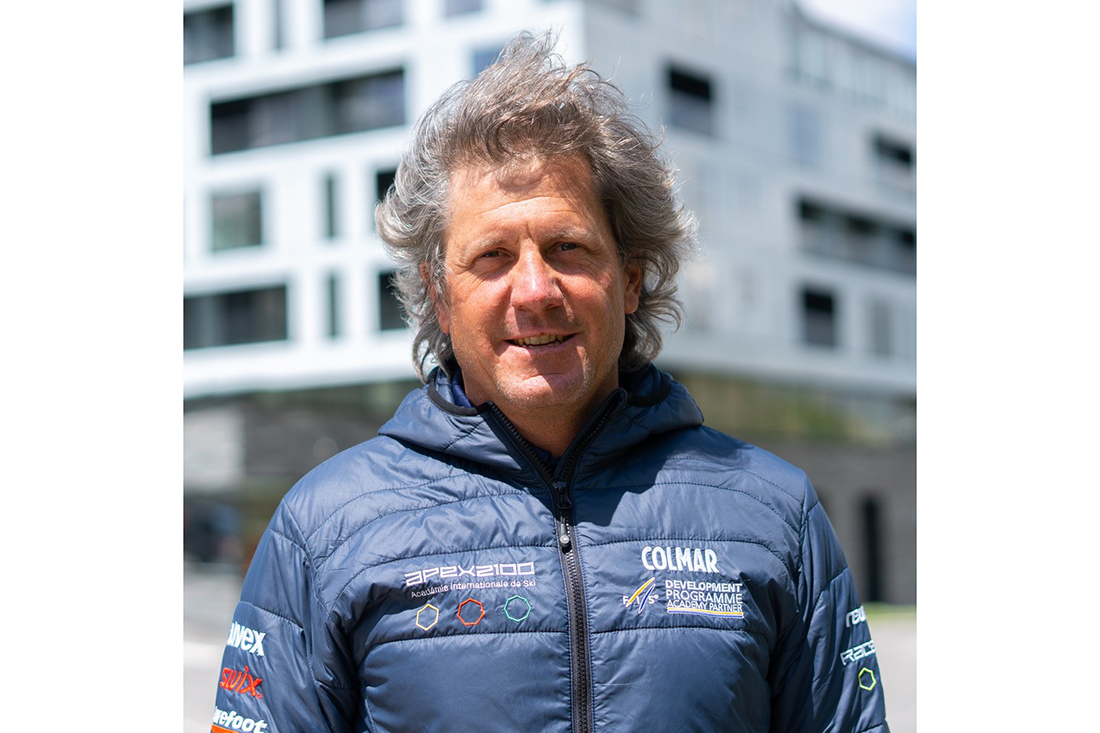32 Degrees: Meet Sasha Rearick
In this article, that appears in the spring 2022 issue 32 Degrees, PSIA Alpine Team member Robin Barnes interviews Sasha Rearick, a 19-year veteran of the U.S. Ski & Snowboard Team who served as the head coach for the Men’s U.S. Ski Team for 10 years, taking him to the Winter Olympics three times. He is also a PSIA-certified Alpine Level III member.
Robin: What is your skiing background?
Sasha: I grew up in New York City and started skiing when my dad bought me skis with mouse trap bindings… used with Sorel boots. When I was 11, I joined the local ski team and eventually went to Gould Academy in Maine. That’s where I fell in love with skiing and racing.
I studied sports science in college and wanted to apply what I learned to skiing, so I earned certifications from the United States Ski Association (USSA) and the National School of Skiing and Mountaineering (ENSA) in France. Staying in France to work at a ski school, I fell in love with the pedagogy (the art, science, or profession] of teaching.
I’ve also coached at the U.S. Olympic Training Center in Colorado, Vermont’s Green Mountain Valley School, and was the head coach of the U.S. Men’s Ski Team for 10 years.
R: What did you learn from teaching skiing that applies to coaching world-class racing?
S: There are endless ways to teach someone how to ski IF you understand their goals. The most important aspect of teaching is reaching your student… understanding their skills – where they are – and their goals – where they want to go. Everyone is unique, and, as a teacher, it’s your goal to help them achieve their goals.
R: What lights you up when you’re on the hill coaching?
S: It lights me up when someone figures out a new movement pattern and you know you’ve helped them get to that place. And effort! It inspires me to work with an athlete when they put in the effort and are willing to struggle through challenges.
R: Do you have an overriding philosophy about coaching?
S: I chunk skiing into basic concepts. There are the U.S. Ski Team fundamentals, which we developed in 2014 in collaboration with the PSIA Alpine Team. We also adhere to the skills of rotation, edging, and pressure control. Playing with those chunks – fundamentals and skills – helps us help our athletes improve. We give our athletes the tasks and let them figure it out on their own.
My early coaching mistake was trying to get a certain athlete to ski like a different athlete. It works best to understand the athlete where they are, and then to use the fundamentals as a guide. It’s up to the athlete to express the fundamentals.
R: Throughout your time teaching and coaching, what’s stayed the same and what’s changed?
S: In racing, athletes’ expectations are consistently too high. Ambition is important, but you shouldn’t expect you’ll win. To be successful, work hard, give your best effort, and embrace the struggle. Too many racers preoccupy themselves with results. It should come as no surprise to seasoned pros that the process itself – or grit – is the most important aspect of success. Learning is messy. If someone is always doing well, they’re not learning. We need to be okay with messy.
With regard to teaching, I think back to when the U.S. Ski Team coaches and athletes participated in PSIA Alpine Level III exam training in 2014. It was a huge learning experience for me. A big theme of the event was how to actually separate your upper and lower body when skiing. During the training with PSIA, the U.S. Ski Team staff learned how to create upper and lower body stability and separation by turning the legs more than the upper body.
Another takeaway was the athletes’ ability to use the fundamentals to ski all conditions, all day, on GS skis. We were all on 35-meter GS skis and the first couple of days everyone complained. Afterward, everyone said, “This is my favorite ski!”
Lastly, we learned about efficiency. We skied from bell to bell every day, and ski racers don’t do that. Working toward balance and efficiency, even though it wasn’t specifically addressed, helped us all become better skiers. I never skied so well as I did in the PSIA camp!
R: Anything else you’d like to share with PSIA-AASI members?
S: Keep inspiring as many people as you can with your love of skiing. We’re lucky to work outside, and in a profession that encourages us to continue to learn.







